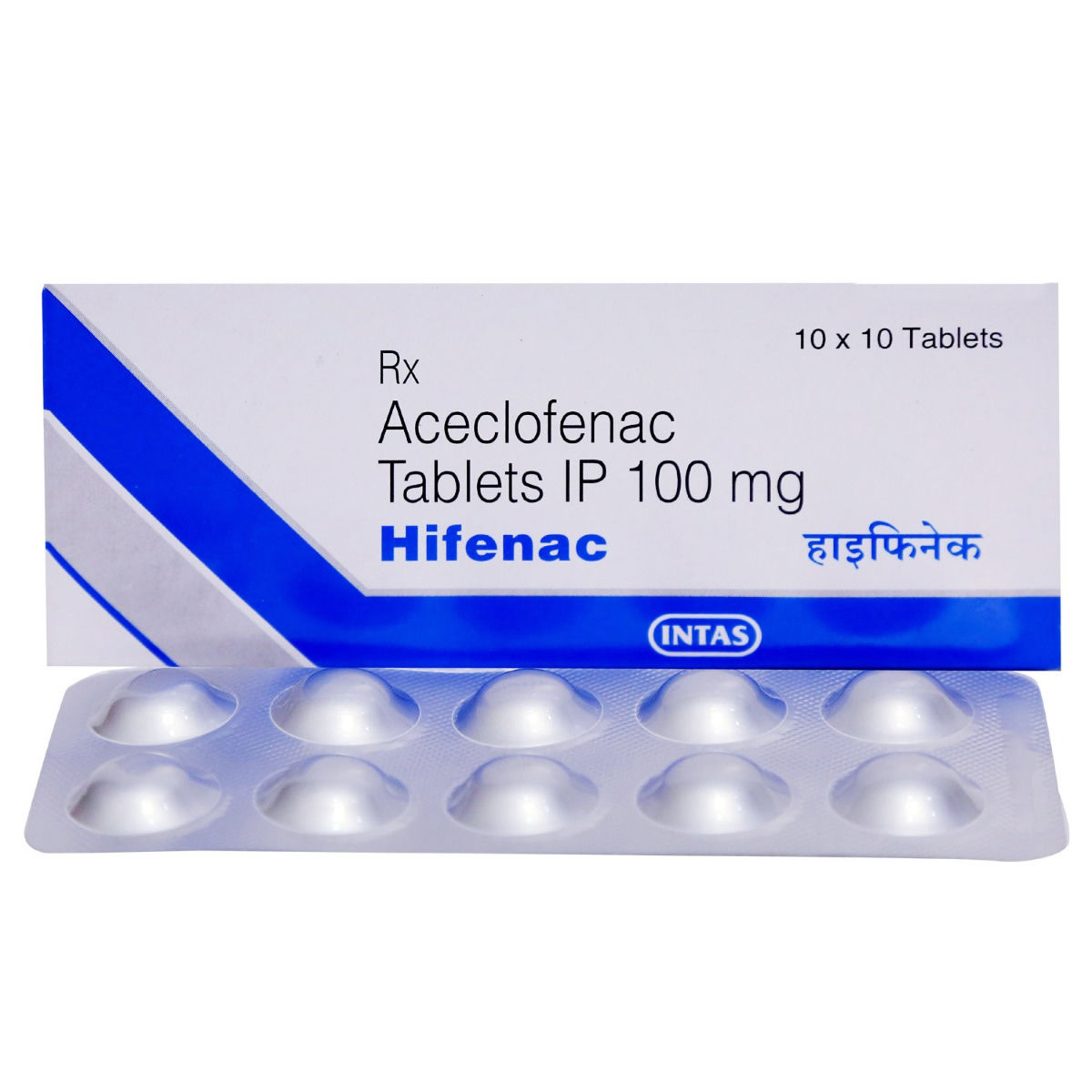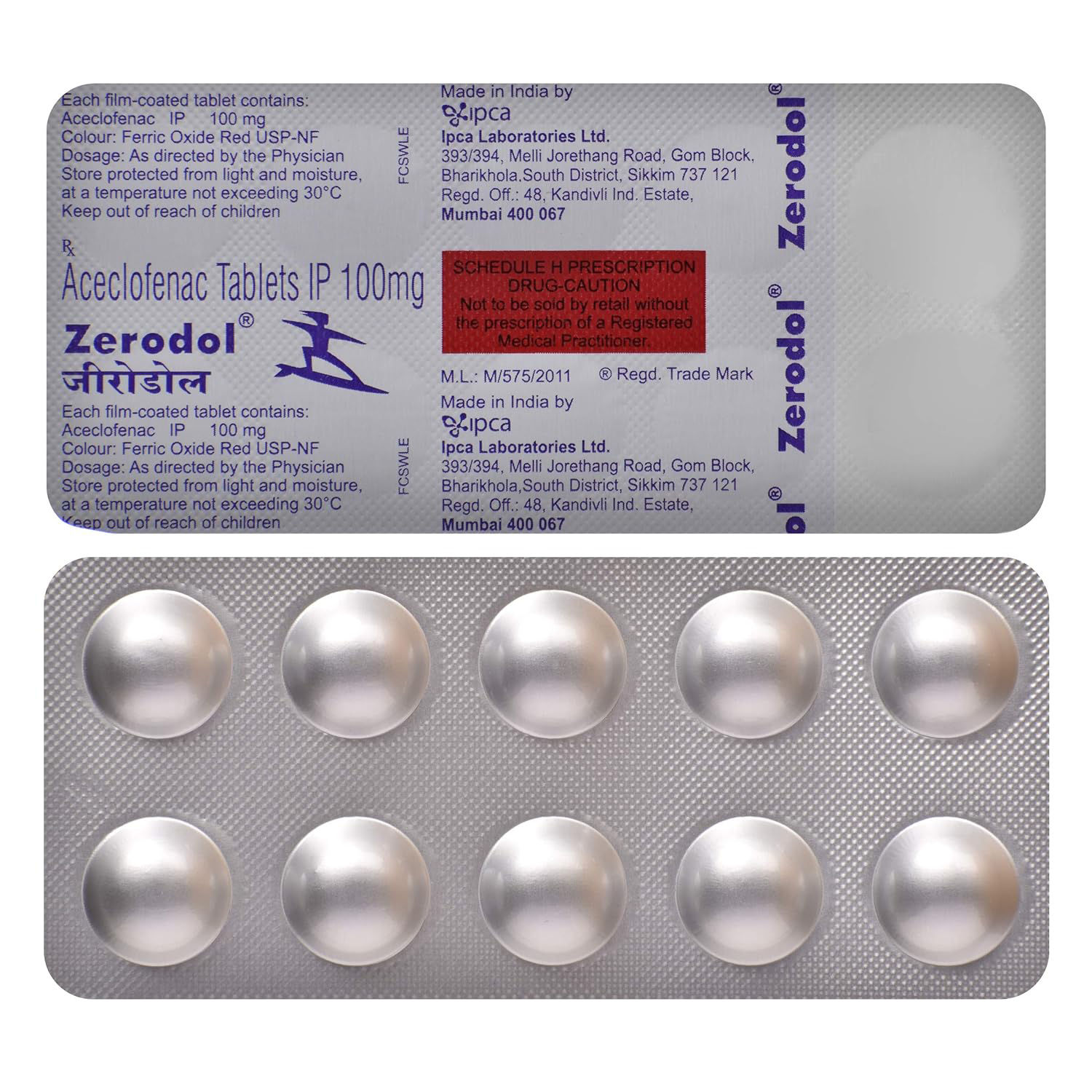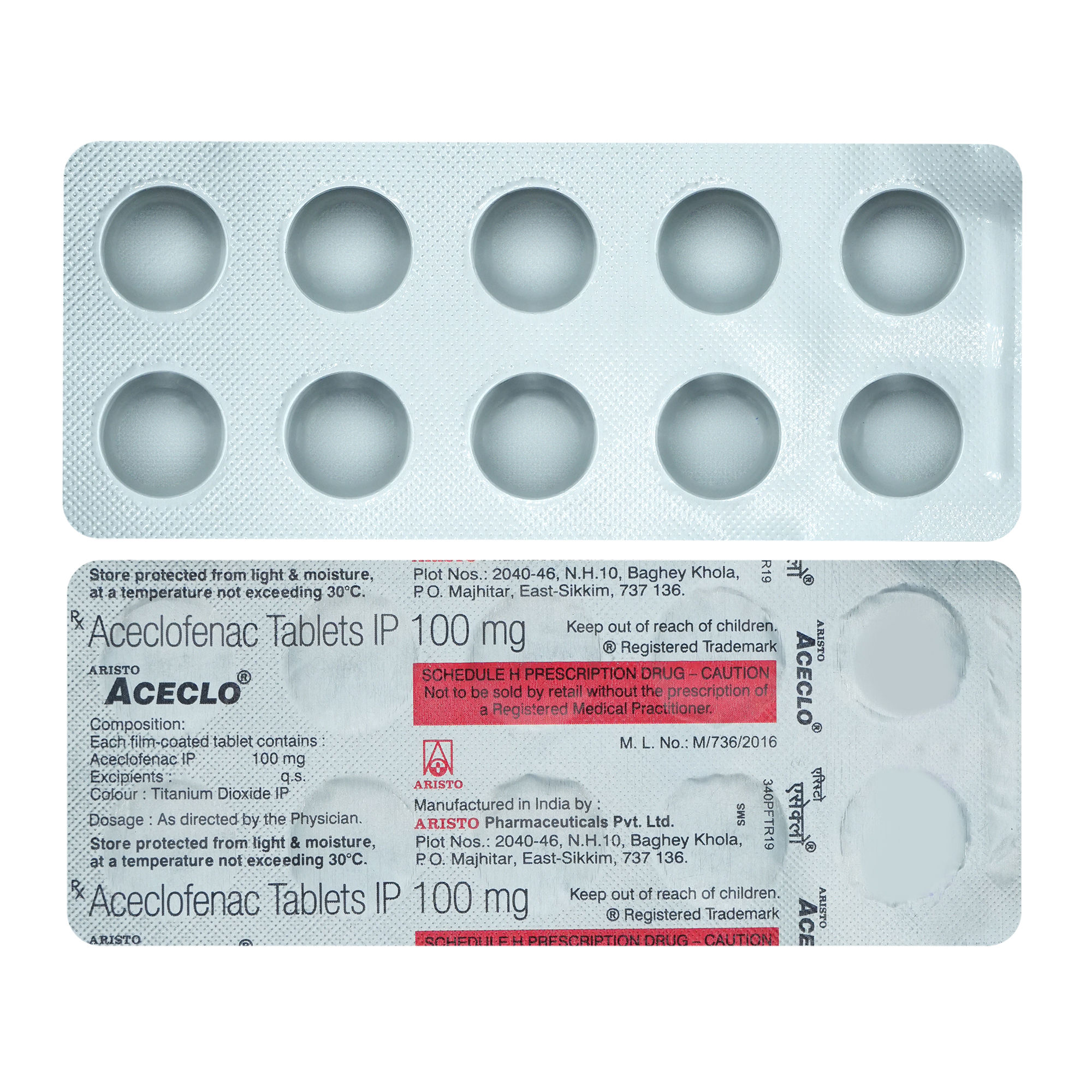Hifenac Tablet 10's





₹56.3*
MRP ₹62.5
10% off
₹53.12*
MRP ₹62.5
15% CB
₹9.38 cashback(15%)
Free Delivery
With Circle membership
(Inclusive of all Taxes)
This offer price is valid on orders above ₹800. Apply coupon PHARMA10/PHARMA18 (excluding restricted items)
Hifenac Tablet is used to reduce and relieve pain, and inflammation (swelling) associated with osteoarthritis, rheumatoid arthritis and ankylosing spondylitis. It contains Aceclofenac, which reduces the production of prostaglandins and helps in reducing mild to moderate pain and inflammation. In some cases, it may cause certain common side effects such as dizziness, diarrhoea, nausea, and increased liver enzymes in the blood. Before taking this medicine, you should tell your doctor if you are allergic to any of its components or if you are pregnant/breastfeeding, and about all the medications you are taking and pre-existing medical conditions.
Know Your Delivery Time
Provide Delivery Location
Available Offers
 Prescription drug
Prescription drugWhats That
 20 people bought
20 people bought 
Secure Payment

India's Most Trusted Pharmacy

Genuine Products
Composition :
Manufacturer/Marketer :
Consume Type :
Return Policy :
Expires on or after :
About Hifenac Tablet
Hifenac Tablet belongs to a group of medicines called Non-Steroidal Anti-Inflammatory Drugs (NSAIDs) or painkillers. These drugs are used to reduce and relieve pain and inflammation (swelling) associated with osteoarthritis, rheumatoid arthritis, and ankylosing spondylitis. Arthritis is a condition that affects the joints. Symptoms include swelling, pain, inflammation, stiffness, and tenderness.
Hifenac Tablet contains 'Aceclofenac', which works by blocking the effect of a chemical messenger known as cyclo-oxygenase (COX) enzyme that makes other chemical prostaglandins. By blocking the effect of COX enzymes, fewer prostaglandins are produced. This helps in reducing mild to moderate pain and inflammation at the injured or damaged site.
In some cases, Hifenac Tablet may cause certain common side effects such as dizziness, diarrhoea, nausea, and increased liver enzymes in the blood. Most of these side effects do not require medical attention and will resolve gradually over time. However, you are advised to talk to your doctor if you experience these side effects persistently.
Consult your doctor if you are pregnant or breastfeeding. Hifenac Tablet may cause drowsiness and dizziness, so drive with caution. Hifenac Tablet is not recommended for children as safety and efficacy have not been established. Avoid consuming alcohol along with Hifenac Tablet as it could lead to increased drowsiness and dizziness; it might also increase the risk of stomach bleeding. Keep your doctor informed about your health condition and medicines to rule out any side effects.
Uses of Hifenac Tablet
Directions for Use
Medicinal Benefits
Hifenac Tablet belongs to a group of medicines called Non-Steroidal Anti-Inflammatory Drugs (NSAIDs) used to reduce and relieve pain, redness, and inflammation (swelling) in patients suffering from osteoarthritis, rheumatoid arthritis and ankylosing spondylitis. Hifenac Tablet works by blocking the effect of a chemical messenger known as cyclo-oxygenase (COX) enzyme that makes other chemical prostaglandins, which are produced at injury sites and cause pain and swelling. By blocking the effect of COX enzymes, fewer prostaglandins are produced. This helps in reducing mild to moderate pain and inflammation at the injured or damaged site.
How Hifenac Tablet Works
Storage
Side Effects of Hifenac Tablet
- Dizziness
- Diarrhoea
- Nausea
- Increased liver enzymes in the blood
What if I have taken an overdose of Hifenac Tablet
Drug Warnings
If you have had any recent heart surgery, do not take Hifenac Tablet as it can increase the risk of heart attack or stroke. Do not take Hifenac Tablet if you are allergic to aceclofenac or other NSAIDs (such as ibuprofen, diclofenac or naproxen); if you have stomach ulcers, have suffered bleeding problems, clotting problems, severe heart, liver or kidney problems. Inform your doctor if you have or have had disorders of the stomach, blood circulation problems to the brain, asthma, porphyria (blood disorder), diabetes, high blood pressure, auto-immune diseases, connective tissue diseases; if you are recovering from major surgery or if you are elderly. Consult your doctor if you are pregnant or breastfeeding. Hifenac Tablet may cause drowsiness and dizziness, so drive only if you are alert. Hifenac Tablet is not recommended for children as safety has not been established. Avoid consuming alcohol along with Hifenac Tablet as it could lead to increased drowsiness and may also increase the risk of stomach bleeding. Stop taking Hifenac Tablet and consult your doctor immediately if you have stomach pain or any signs of bleeding in the intestine or stomach, such as blood in stools. Do not take any other NSAIDs for pain relief along with Hifenac Tablet unless prescribed.
Drug-Drug Interactions
Drug-Drug Interactions
Login/Sign Up
Co-administration of Atenolol with Hifenac Tablet 10's could increase the risk of low blood pressure.
How to manage the interaction:
Although there is a possible interaction between Atenolol and Hifenac Tablet 10's, you can take these medicines together if prescribed by a doctor. Consult a doctor if you experience excessive sweating, shortness of breath, palpitations, or chest discomfort. Do not discontinue any medications without consulting a doctor.
Drug-Food Interactions
Drug-Food Interactions
Login/Sign Up
Diet & Lifestyle Advise
- Physical activity strengthens muscles and relieves joint stiffness. Gentle activities like 20-30 minutes of walking or swimming are helpful.
- Performing yoga may also help in improving joint flexibility and pain management.
- Maintain a healthy weight by performing regular low-strain exercises and eating healthy food.
- Get adequate sleep, as resting the muscles can help in reducing inflammation and swelling.
- Follow heat or cold therapy, and regularly apply a cold or hot compress on the joints for 15-20 minutes.
- De-stress yourself by meditating, reading books, taking a warm bubble bath or listening to soothing music.
- Acupuncture, massage and physical therapy may also be helpful.
- Eat food rich in antioxidants such as berries, spinach, kidney beans, dark chocolate, etc.
- Foods containing flavonoids help in reducing inflammation. These include soy, berries, broccoli, grapes and green tea.
- Avoid smoking and alcohol consumption.
Habit Forming
Therapeutic Class
Hifenac Tablet Substitute

Zerodol 100 Tablet 10's
by Others
₹5.85per tabletAceclo Tablet 10's
by Others
₹5.49per tabletDolowin 100 mg Tablet 10's
by Others
₹5.40per tabletDolokind Tablet 10's
by Others
₹3.83per tabletAcemiz 100 Tablet 10's
by Others
₹8.01per tablet
Product Substitutes
Alcohol
Unsafe
Avoid consumption of alcohol while taking Hifenac Tablet as it may cause increased drowsiness. It can also increase the risk of stomach bleeding.
Pregnancy
Caution
Please consult your doctor if you have any concerns about this. Your doctor will prescribe only if the benefits outweigh the risks.
Breast Feeding
Caution
It is not known if Hifenac Tablet passes into breastmilk. Please consult your doctor before taking Hifenac Tablet ; your doctor will decide whether Hifenac Tablet can be taken by breastfeeding mothers or not.
Driving
Caution
Hifenac Tablet may cause drowsiness, dizziness and tiredness. Do not drive or operate machinery unless you are alert.
Liver
Caution
Dose adjustment may be needed in patients with liver impairment. Please consult your doctor if you have a liver impairment or any concerns regarding this.
Kidney
Caution
Dose adjustment may be needed in patients with kidney impairment. Please consult your doctor if you have kidney impairment or any concerns regarding this.
Children
Unsafe
Hifenac Tablet is not recommended for children as the safety and effectiveness were not established.
FAQs
Country of origin
Manufacturer/Marketer address
Disclaimer
Author Details
We provide you with authentic, trustworthy and relevant information
Reference
- https://www.medicines.org.uk/emc/files/pil.4240.pdf
- https://www.drugs.com/uk/aceclofenac-100mg-tablets-leaflet.html
- https://file.wuxuwang.com/hma/SK_H_0225_001_FinalPL.pdf
- https://patient.info/medicine/aceclofenac-tablets-for-pain-and-inflammation-preservex
- https://dailymed.nlm.nih.gov/dailymed/drugInfo.cfm?setid=8a023942-01e8-4849-aa3c-1a640ffc7fd3
























